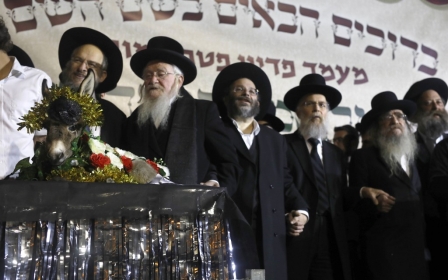Israel election: The triumph of Kahanism

The biggest winners in Tuesday’s Israeli election appear to be Prime Minister Benjamin Netanyahu and the little-known Religious Zionist Party. Behind the milquetoast name is an alliance of some of the most extreme Kahanist elements in Israeli politics.
According to the results announced so far, a race that had been predicted as a virtual tie between centrist and rightist parties may offer Netanyahu a narrow path to a renewed term as prime minister. Far-right and religious parties, likely coalition partners for Netanyahu, were victorious in the election.
At the time of publication, however, it remained unclear as to whether this coalition would be able to secure the needed 61-seat majority.
The question is: will the suspicion and hostility with which some of these party leaders, such as Gideon Saar and Naftali Bennett, view Netanyahu outweigh their desire for political power? If history is any judge, they will put aside their personal rancour and play the political game.
Now begins the horse-trading, during which potential partners play hard to get, extracting the maximum in ministerial portfolios and other perquisites before adding their support to the coalition.
New MEE newsletter: Jerusalem Dispatch
Sign up to get the latest insights and analysis on Israel-Palestine, alongside Turkey Unpacked and other MEE newsletters
Collapse of Blue and White
Election turnout was 67 percent, down from the most recent election and the lowest percentage since 2013. The initial results would suggest that many of those who elected not to vote had previously supported the moderate parties that performed better in the last election.
There are two critical factors leading to this outcome. The first was the near-collapse of the centre-right Blue and White coalition, which won 33 seats in the last Knesset. The decision by its then-leader, Benny Gantz, to desert his partners and enter a coalition with Netanyahu led to a drastic decline in its vote share. With close to 90 percent of Tuesday’s vote counted, Blue and White picked up only eight seats, while Yesh Atid, which split from Blue and White last year, won 17. This fracture essentially destroyed the centre-right as a viable alternative to Netanyahu’s far-right Likud-led coalition.
Diaspora Jewish leaders could declare that Netanyahu has gone too far, and refuse to raise funds for Israel or to attend meetings with Israeli government officials
Voters who abandoned Gantz did not necessarily turn to his former partners in Yesh Atid, which represented a moderate option, nor to Likud, which lost several seats compared to the last election. They were likely disenchanted with Netanyahu and the multiple corruption charges he faces, so they turned to newly formed parties generally even farther to the right.
By fleeing to parties likely to join a governing coalition with Likud, however, they might have guaranteed an outcome they did not foresee. Postponed until after the election, Netanyahu’s corruption trial is scheduled to resume in early April, and Likud sources have pointed to legislative outcomes that could provide him immunity from conviction while in office, including passage of the “French Law”.
A more draconian and controversial method would be for a new justice minister to fire the current attorney general and appoint one who would dismiss the charges, eliminating the greatest threat to Netanyahu’s continuing on as leader.
Extreme nationalist views
Though there are regular protests against Netanyahu’s corruption, which would likely increase if charges were dropped, it is unlikely they would reach a tipping point and lead to Netanyahu stepping down. Even if he did, the rivals waiting in the wings are no less extreme in their nationalist views; the country would merely be swapping one Judeo-supremacist autocrat for another.
Voters who turned away from Blue and White appear to have favoured soft-right parties, such as Saar’s New Hope, and some even farther right than Likud, including Bennett’s Yamina and the Kahanist Religious Zionist Party, led by Bezalel Smotrich.
Smotrich was once apprehended by the Shin Bet for allegedly plotting a terror attack to protest Israel’s Gaza withdrawal, although charges were never laid. He once boldly claimed that Jews cannot be terrorists; in other words, one man’s terrorist is another’s freedom fighter.
In 2006, to protest the Gay Pride parade, he organised a “parade of beasts”, in which goats and donkeys were marched through the streets of Jerusalem. He has called himself a “proud homophobe”. He has served as an MK with the Yamina alliance and as minister of transportation.
Smotrich is allied with Itamar Ben-Gvir, whose political evolution as a youth led him into the arms of far-right Rabbi Meir Kahane. According to a Haaretz report: “First, he joined the youth movement affiliated with Moledet, a right-wing political party that advocated ‘transferring’ Israeli Arabs out of the country. But that turned out to be too tame for him. So not long thereafter, he defected to Kach, the eventually outlawed racist party founded by the American-born Rabbi Kahane. ‘I found in this movement a lot of love for the Jewish people, a lot of truth, and a lot of justice,’ says Ben-Gvir.”
Breaking with precedent
As a teenager, Ben-Gvir gained notoriety in 1995, when he vandalised then-Prime Minister Yitzhak Rabin’s vehicle and brandished its Cadillac hood ornament, boasting: “We got the car. We’ll get to Rabin too.” Rabin was murdered only weeks later by another Kahanist.
Ben-Gvir is now the go-to defence lawyer for settlers charged with terrorist attacks against Palestinians. He is the Israeli equivalent of US lawyer and politician Rudy Giuliani, except instead of representing sleazy crooks, he represents accused mass murderers. He lives in Hebron, among the most violent of settler enclaves, where Jews and Palestinians are separated by barbed wire, locked metal gates and thousands of Israeli soldiers, who protect the settlers from the wrath of the indigenous population.
Despite several prior attempts, Ben-Gvir has never served in the Knesset. His alliance succeeded this time for one reason only: Netanyahu made clear to far-right voters that if they weren’t voting Likud, he preferred they vote for the Religious Zionists. He also said the party would be a coalition partner in his next government, a striking break with previous precedent.
In 1988, Kahane’s newly founded Kach Party was so far outside the mainstream that the government banned it, and both Israel and the US have declared Kach to be a terrorist organisation. No Israeli leader has ever promoted an explicitly Kahanist party, let alone agreed to include one in a governing coalition - meaning it’s likely the Religious Zionists will obtain at least one ministerial portfolio representing the interests of their settler constituency. This offers unprecedented access to Israeli protocols and power.
This should not be surprising to anyone aware of the history of the Zionist movement. At least two former Israeli prime ministers, Menachem Begin and Yitzhak Shamir, were accused terrorists, linked to the King David Hotel bombing, the Deir Yassin massacre and the assassination of UN peace negotiator Count Folke Bernadotte, among other crimes.
Flirting with terrorists
There is one powerful way in which the world could respond to Netanyahu’s flirtation with supporters of Jewish terrorism: the US government, UN and EU could declare this government persona non grata, and refuse to have any dealings with it. It would be a diplomatic version of boycott, divestment and sanctions (BDS).
Israel is united in its determination to pursue racist, apartheid policies. The world is not united in opposing them
Diaspora Jewish leaders could declare that Netanyahu has gone too far, and refuse to raise funds for Israel or to attend meetings with Israeli government officials.
Contrary to what some believe, international pressure works. While Israel may complain grievously about bias towards it, when push comes to shove, such pressure works in modifying Israeli behaviour - though usually not in significant ways, as Israel does the bare minimum to avoid international censure.
Regardless, a united front of western democratic governments and diaspora Jewish leaders would offer a powerful statement, defining a red line that Israel has crossed. And yet, the likelihood of this happening is almost nil. Israel is united in its determination to pursue racist, apartheid policies. The world is not united in opposing them. It dithers while Rome burns.
The views expressed in this article belong to the author and do not necessarily reflect the editorial policy of Middle East Eye.
This article is available in French on Middle East Eye French edition.
Middle East Eye delivers independent and unrivalled coverage and analysis of the Middle East, North Africa and beyond. To learn more about republishing this content and the associated fees, please fill out this form. More about MEE can be found here.







